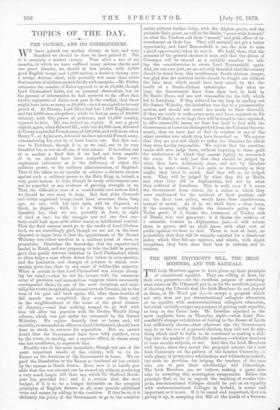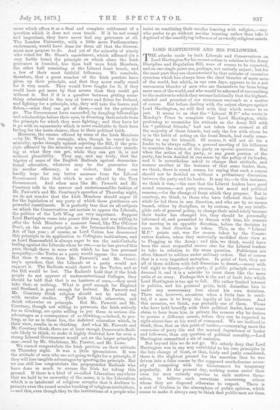THE HUSH UNIVERSITY BILL, THE IRISH MEMBERS, AND THE RADICALS.
THE Irish Members appear to have given up their principle. of educational equality. They are willing at least, for their own purposes,—for the excellent purpose of unsettling what exists, as Mr. O'Donnell put it, or for the excellent purpose of showing the Liberals that the Irish Members do not depend' on them, as Dr. Ward put it,—to accept a proposal which not only does not put denominational collegiate education on an equality with undenominational collegiate education, but which virtually resigns any prospect of gaining such equality,. so. long as the Union lasts. Mr. Lowther repeated in the most emphatic form on Thursday night—what Lord Bea- consfleld's strange exhibitions of feeling in the House of Lords. had sufficiently shown—that whatever else the Government. may do on the eve of a general election, they will not do ally- thing which shall be liable to be construed as putting a shil- ling into the pockets of Catholic teachers,—whether teachers of mere secular subjects, or not. And this the Irish Members well know, when they accept the proposed scheme for a new. Irish University on the pattern of the London University, — with plenty of prospective scholarships and fellowships indeed ; but with no provision for helping the teachers of the men who are to gain these scholarships and fellowships. The Irish Members arc, we believe, making a great mis- take in accepting this meaningless compromise. Either the principle that, so far a's regards the teaching of secular sub- jects, denominational Colleges should be put on an equality with undenominational Colleges in Ireland, is sound and important, or it is not. If it be sound and important, they are giving it up, in accepting this Bill at the hands of a Govern- ment which offers it as a final and complete settlement of a question which it does not even touch. If it be not sound and important, they have never had any grievance at all. The London University, with a little more Parliamentary endowment, would have done for them all that the Govern- ment now propose to do. And yet of the minority of ninety who voted for Mr. Shaw's amendment, which affirmed (in a very feeble form) the principle on which alone the Irish grievance is founded, less than half were Irish Members, the other half consisting of the Liberal front bench, and a few of their most faithful followers. We conclude, therefore, that a great number of the Irish patriots have given up their principle, and that they never really cared for it very much. They would have fought for it, if they could have got more by that means than they could get without it. But if it is a question between getting some- thing substantial in the way of loaves and fishes for Ireland, and fighting for a principle, why, they will take the loaves and fishes,—what they can get of them,--and let the principle go. The Government have succeeded, by dangling fellowships and scholarships before their eyes, in diverting their minds from the principle for which they were fighting ; and they have let it go with an equanimity which is more creditable to their keen feeling for the main chance, than to their political faith.
However, the excuse offered by some of the Irish Members —by Dr. Ward, for example, who, though he voted in the minority, spoke strongly against rejecting the Bill, if the prin- ciple affirmed by the minority were not conceded—for snatch- ing at what they can get, while they can get it, is not without plausibility. They say, and say truly, that the bigotry of some of the English Radicals against denomina- tional education, whatever may be the guarantee for its secular efficiency, is so violent, that they can hardly, hope for any better measure from the Liberal Government than that which is now offered by the Tory Government. And when men like Mr. Fawcett and Mr. Courtney talk in the narrow and unstatesmanlike fashion of Mr. Fawcett's and Mr. Courtney's speeches of Thursday night, we do not wonder that the Irish Members should augur ill for the legislation of any party of which these gentlemen are powerful constituents. It is perfectly true that on all subjects on which the Conservatives ard certain to oppose the Liberals, the politics of the Left Wing are very important. Suppose Lord Hartington came into power this year, and was willing to offer the Irish Members a measure based, like The °Timor Don's, on the same principle as the Intermediate Education Act of 'last year ; of course, as Lord Cairns has denounced this principle in its application to Collegiate institutions, and as Lord Beaconsfield is always eager to use the anti-Catholic feeling against the Liberals when he can,—as he has proved this year, though there is none with which he has less personal sympathy,—the Tories as a party would oppose the measure. But then it seems, from Mr. Fawcett's and Mr. Court- ney's speeches, that the Liberals as a party would not support it. The Radicals would desert to the Tories, and so the Bill would be lost. The Radicals hold that if the Irish people do not approve of undenominational Colleges, they should be told that that is no business of ours,—they must take that, or nothing. What is good enough for England and Scotland, is good enough for Ireland. Mr. Fawcett and Mr. Courtney think religion should not be mixed up with secular studies. The' Irish think otherwise, and think otherwise on principle. But Mr. Fawcett and Mr.. Courtney, though not willing to persecute the Irish actively for so thinking, are quite willing to put them to serious dis- advantages as a consequence of so thinking,—indeed, to pro- long, as far as in them lies, the deficient education which, in their view, results in so thinking. And what Mr. Fawcett and Mr. Courtney think, there are at least enough Democratic Radi- cals likely to think, to make it highly doubtful how far even a strong Liberal Government would act on the larger principles ann,-..theed by Mr. Gladstone, Mr. Forster, and Mr. Lowe.
We cannot congratulate the Irish patriots on their attitude on Thursday night. It was a little ignominious. It was the attitude of men who are not going to fight for a principle, if they will lose tangible advantages by ignoring the principle. But we can still less congratulate the propagandist Radicals who have done so much to excuse the Irish for taking this ground. If there is a kind of so-called Liberalism anywhere that we hold to be unworthy of the name, it is the Liberalism which is so intolerant of religious scruples that it declines to promote even the sound secular teaching of religious institutions, —and this, even though they be the institutions of a people who insist on combining their secular learning with religion,—nay who prefer to go without secular learning rather than take it deprived of the sanctifying influence of avowedly religious minds.



































 Previous page
Previous page